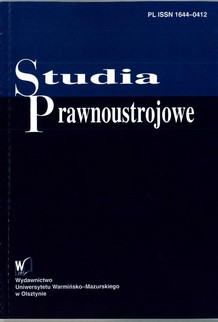Normatywne podstawy wprowadzenia do polskiego porządku prawnego koncepcji prawa podmiotowego do życia w czystym środowisku
Normative basis for the introduction of the concept of subjective right to live in a clean environment in the Polish legal order
Author(s): Michał HejbudzkiSubject(s): Civil Law, Human Rights and Humanitarian Law, Environmental and Energy policy, Human Ecology, Environmental interactions
Published by: Wydawnictwo Uniwersytetu Warmińsko-Mazurskiego w Olsztynie
Keywords: subjective right to live in a clean environment; the right to a clean environment; environment; subjective rights; claims; personal rights; environmental protection;
Summary/Abstract: The research objective of the article focuses on the question whether the regulations currently in force in the Polish legal order provide sufficient grounds to create the entitlements which constitute the content of the subjective right to live in a clean environment or, on the contrary, the existing legal norms are of a blanket nature and contain only the proclamation of the will of the legislator as to the scope and manner of introducing such a subjective right on the basis of separate provisions in the future. According to the author, the issue of deriving the legal foundation for the subjective right to live in a clean environment on the basis of the currently binding legal regulations cannot be assessed unambiguously. The existence of such a right is conditioned by the assumption that a clean environment possesses the values of a personal right within the meaning of Article 23 of the Civil Code, hence this is the source of creation and scope of this subjective right. The author advocates the concept of subjective right to live in a clean environment which gradually, but consistently and increasingly, paves its way in the doctrine of law and jurisprudence. The concept provides a solution that is not without merit. Referring to a certain axiological sensitivity it provides for the civil law protection to previously insufficiently protected areas. Furthermore, it extends the freedom of the courts providing them with flexibility in assessing individual cases submitted to arbitration.
Journal: Studia Prawnoustrojowe
- Issue Year: 2019
- Issue No: 43
- Page Range: 121-140
- Page Count: 20
- Language: Polish

